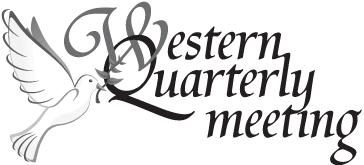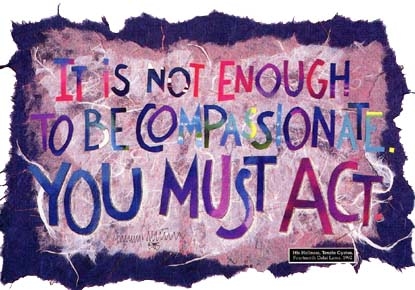A Meditation Published in the West Grove Meeting Newsletter
The Law, the Prophets, the New Testament writers all say the same thing: what you do is important and pleasing to God. One can stand on the corner praying to God as the Pharisee did or be absolutely circumspect in fasting to please God and still be missing the whole point of ‘it’. And what is ‘it’ but to be in relationship with God, with one’s neighbor, with one’s enemy, and with one’s Self.
Too often in religious debates over “faith or works”, works are denigrated and sent to the bottom of the heap while faith is held up high as the gold standard and yet James in the epistle that bears his name says that faith without works is dead and Isaiah the Prophet spells out what God requires of us as a fast. . . to lose the fetters of injustice.
In one of the books we were discussing in the 8:00 Breakfast Club in January was the idea of a ‘foundational consciousness’. Found within the heart of the religions of the world, theistic and nontheistic, is the notion that there exists certain universal truths. Scratch all the way down to the core message and there it is: compassion. Whether family, friend or foe, we are to follow the law of love: loving the other as our self.
This love is not the mushy, sentimental love of a Valentine’s Day card. It is not a box of chocolates. Rather, it is that which Quakers and dissenters throughout history have always known and expressed and done: to stand up for what one believes especially when it goes against the accepted position of those in power; to be active on behalf of those who are in the minority, upholding them, supporting them, and caring whether or not they are given a fair shake. In the past it meant that you might
be burned at the stake or hanged by the neck. Today it means that you may be harassed, denigrated and demeaned and you might lose your job or ‘standing’ in the community. Isaiah gives us the blueprint of the practical things we are to do: lose the fetters of injustice; untie the knots of the yoke; set free those who have been crushed; share your food with the hungry; take the homeless and poor into your house; clothe the naked when you meet them; never evade a duty to your kinsfolk.
None of these are easy. Just look at the backlash created by wanting to raise a minimum wage which is so low that it will not support one person let alone a family. And the homeless: have you ever invited a homeless person into your house? I have not.
Never evade a duty to a family member? That is perhaps the hardest of all… we know each other too well. The yoke that has crushed others? Being other than white in a white world; being a woman in a man’s world, even today; being poor in a rich world; being homo-sexual/bi-sexual/transgender in a heterosexual world. I cannot solve all of the problems and relieve all of the injustices. But, I can do what I can do when I am faced with an injustice. I am told that ‘the person who knows the good they ought to do and does not do it is a sinner’. When I see a need, I am bound to address it. Otherwise, I sin against myself. If I do not help relieve you of the injustice crushing you, I am also the loser. We are truly one in the web of life and where one part is suffering, the whole suffers.
Micah 6:8
God has told you what is good;
and what is it that the Lord asks of you?
Only to act justly, and follow the law of love.
Isaiah 58: 6,7
Is this not what I require of you as a fast:
to loose the fetters of injustice,
to untie the knots of the yoke,
to snap every yoke
and set free those who have been crushed?
Is it not sharing your food with the hungry,
taking the homeless poor into your house,
clothing the naked when you meet them
and never evading a duty to your kinsfolk?
Deuteronomy 6:5 & Leviticus 19:18
You shall love the Lord your God with all your heart
and soul and strength –
and your neighbor as yourself.
James 4:17
Well then,
the person who knows the good they ought to do
and does not do it
is a sinner.


Comments are closed.